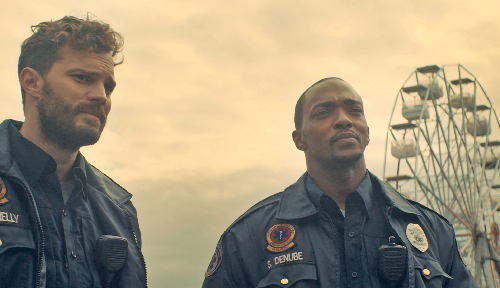
 Whereas the directing duo’s first feature, Resolution, centered on drug withdrawal, Justin Benson and Aaron Moorhead’s fourth, Synchronic, enables and endorses a pharmaceutical bender. But, hey, as you’ll see, it’s for a good cause!
Whereas the directing duo’s first feature, Resolution, centered on drug withdrawal, Justin Benson and Aaron Moorhead’s fourth, Synchronic, enables and endorses a pharmaceutical bender. But, hey, as you’ll see, it’s for a good cause!
In New Orleans, word on the street is all about a new designer drug called Synchronic. Like DMT, it’s highly hallucinogenic, pummeling the user’s pineal gland into psychoactive submission. Side effects include venomous snakebites, sword stabbings and elevator-shaft dismemberments. That’s because the drug transports the user back in time — prehistoric, even — at seven-minute intervals with lasting real-world results.
As paramedics, best buds Steve (Anthony Mackie, Avengers’ Falcon) and Dennis (Jamie Dornan, Fifty Shades of Grey’s BDSM BMOC) have seen the worst of that damage. But when Dennis’ sullen teen daughter (Ally Ioannides, TV’s Into the Badlands) disappears after a dose and doesn’t come back? Steve starts experimenting to see if she can be retrieved. That’s when things get — in his words — “kangaroo-shit loony.”
Rich in New Orleans tradition and superstition, Synchronic‘s story is haunted by the ghosts of Hurricane Katrina. The filmmakers shoot the city as if in recovery — under a woozy, narcotized haze, with a camera that sometimes floats like a week-old helium balloon and the sky coated in an unnatural baby-aspirin orange. The sudden merging of time periods in a Bourbon Street slipstream gives the movie its strongest and most memorable visuals, as worlds collide with an unsettling weirdness as “off” as the mutated flora and fauna of Annihilation, to name another extraordinary modern film that doesn’t play by sci-fi’s standard rules. As a viewer accustomed to every templated move of the genre, I like not knowing quite where a film is headed.
Although initially a two-hander, Synchronic shifts focus to Steve and his time-travel tests, which Mackie is amiable enough to sell. You can’t help but like his deeply flawed character as over and over, he embarks on what increasingly looks to be a suicide mission, strictly out of brotherly love for his lifelong friend. That sidelines Dennis to cope and mourn — more or less offscreen — with his wife (Katie Aselton, 2015’s The Gift). Effectively hamstrung against Mackie’s magnetism, Dornan is a bit of a nonentity as Dennis, but in the works of Moorhead & Benson (as they now bill themselves, like a cigarette brand), the concept is the star. —Rod Lott

